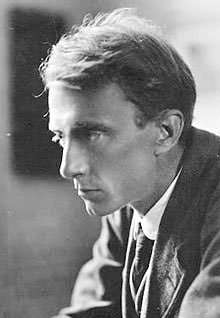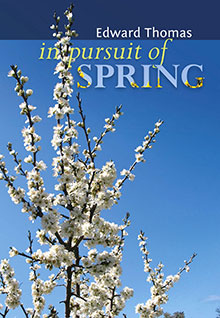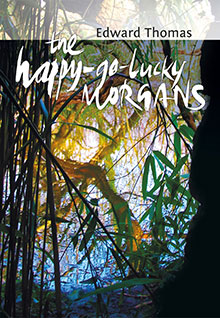Edward Thomas
3 March 1878 – 9 April 1917
Philip Edward Thomas was an Anglo-Welsh writer of prose and poetry. Already an accomplished writer, Thomas turned to poetry only in 1914. He enlisted in the army in 1915, and was killed in action during the Battle of Arras in 1917.
Thomas was born in Lambeth, London. His family were mostly Welsh. Unusually, he married while still an undergraduate and determined to live his life by the pen. He then worked as a book reviewer, reviewing up to 15 books every week. He was already a seasoned writer by the outbreak of war, having published widely as a literary critic and biographer, as well as a writer on the countryside. He also wrote a novel, The Happy-Go-Lucky Morgans, 1913.
Thomas worked as literary critic for the Daily Chronicle in London and became a close friend of Welsh tramp poet W H Davies, whose career he almost single-handedly developed. From 1905, Thomas lived with his wife Helen and their family at Elses Farm near Sevenoaks, Kent. He rented a tiny cottage nearby for Davies and nurtured his writing as best he could. On one occasion, Thomas even had to arrange for the manufacture, by a local wheelwright, of a makeshift wooden leg for Davies.
Even though Thomas thought that poetry was the highest form of literature and regularly reviewed it, he only became a poet himself at the end of 1914. Living at Steep, in East Hampshire, he initially published some poetry under the name Edward Eastaway. His change from prose to poetry was partly due to the encouragement of American poet Robert Frost - they had become close friends in 1913.
His work as a poet has been celebrated and admired by W H Auden, Cecil Day-Lewis, Dylan Thomas, Philip Larkin, Andrew Motion, Michael Longley and Ted Hughes perhaps no poet ever valued him more highly than Robert Frost: "We were greater friends than almost any two ever were practising the same art," he remarked. Thomas had pulled his friend's work from obscurity into a clearing, from which the American would go on to sell a million poetry books in his lifetime. Frost, in turn, released the poet within Thomas, and would even find a publisher for his verse in the United States. That book would carry a dedication that Thomas had scribbled on the eve of sailing for France: To Robert Frost. Frost responded in kind, writing: Edward Thomas was the only brother I ever had.
Thomas enlisted in the Artists Rifles in July 1915, despite being a mature married man who could have avoided enlisting, in part after reading Frost’s The Road Not Taken. He was killed in action soon after he arrived in France at Arras on Easter Monday, 9 April 1917. Although he survived the actual battle, he was killed by the concussive blast wave of one of the last shells fired as he stood to light his pipe.
Close friend W H Davies was devastated by the death and his commemorative poem Killed In Action (Edward Thomas) was included in Davies’s 1918 collection Raptures.
After the war, Helen wrote about her courtship and early married life with Edward in the autobiography As it Was, 1926; later she added a second volume, World Without End, 1931. Myfanwy, their daughter, later said the books were written by her mother as a form of therapy to help lift her out of a deep depression to which she succumbed following Edward’s death.
Thomas is commonly considered a war poet, although few of his poems deal directly with his war experiences - his poems are noted for their attention to the English countryside and a certain colloquial style. On 11 November 1985, Thomas was among 16 Great War poets commemorated on a slate stone unveiled in Westminster Abbey’s Poet’s Corner. The inscription, written by fellow Great War poet Wilfred Owen, reads: My subject is War, and the pity of War. The Poetry is in the pity.
In 1985 Thomas was described by poet laureate Ted Hughes as …the father of us all.
Matthew Hollis’s biography Now All Roads Lead to France: The Last Years of Edward Thomas, was published to great acclaim in 2011 and was shortlisted for the Costa Book Award.


